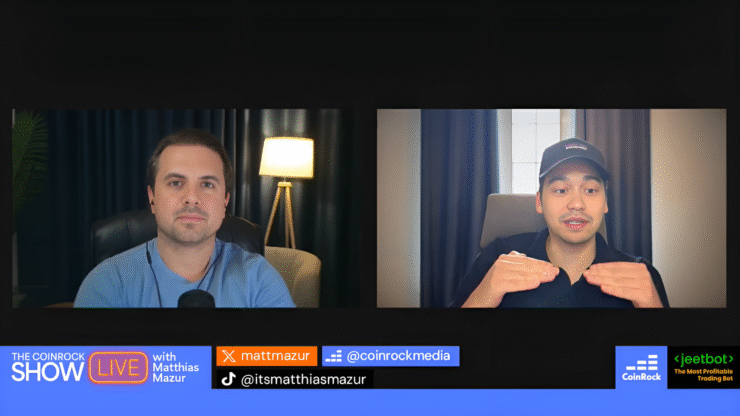It was a green-letter day on The CoinRock Show as host Matthias Mazur opened with a market recap that, for the first time in weeks, wasn’t all gloom. Bitcoin briefly crossed the $100K threshold, Ethereum popped nearly 7%, and even meme coin sentiment seemed to be stirring. “We haven’t seen green in a few months now,” Matthias noted, pointing to renewed interest driven by macro hopes and political posturing.
Much of the optimism, he suggested, hinged on reduced uncertainty around U.S.–China trade tensions and speculative optimism tied to Trump’s recent announcements.
“We don’t need full certainty—we just need less uncertainty,” Matthias said, reminding viewers that we are trading in a “Trump-dependent market” where even a tweet can move billions.

While ETH rallied, Matthias didn’t hold back his long-running critique of the Ethereum Foundation’s communication failures, branding its narrative strategy chaotic at best. Still, he stood firm in his bullish outlook.
“I’ve been bullish ETH for a long time. You guys hear me, right? And the beautiful thing about not being a KOL is that I can actually tell you the truth. I can tell you what I think without needing to shill a coin, right?”
With the charts flashing green and the audience warmed up, Matthias cued the spotlight for the day’s special guest—someone who has been building at the intersection of AI, DePIN, and purpose-driven entrepreneurship long before it was trendy.
Enter Julian Au: Founder-Building Force in AI & Web3
With markets finally flashing green, Matthias welcomed a very different kind of guest to the CoinRock stage—Julian Au, the kind of founder who defies every cliché in the book. Canadian-born, ADHD-powered, and endlessly inventive, Julian’s story isn’t just about crypto—it’s about the messy, often-overlooked human process behind building anything meaningful in tech.
From humble beginnings in Newfoundland—“the most easterly point in Canada,” as he proudly notes—to designing a Chromecast-style cloud computer for students using just a Raspberry Pi, Julian’s career reads like a playbook for purpose-driven innovation. He built that device in his early 20s to help underserved students access full desktops remotely, eventually landing on the news and proving that big ideas can come from the smallest corners of the world.
But his journey wasn’t always linear. He admits to “faking” his first idea to get into an accelerator, getting crushed by a mentor, and walking away with a new lesson: ideas are cheap, execution is everything. That realization would lead him to product ownership roles in California and, later, to becoming the youngest graduate lecturer at Memorial University—teaching over 150 PhD and Master’s students how to turn research into real-world ventures.
“I tell people,” Julian explained,
“It’s not always good to actually tell your ideas to those you love or your parents, even though you do feel like you have a high respect for them. It’s that they haven’t done that journey before.”
It’s this grounded, brutally honest perspective that defines Julian’s approach. He coined the term “Trauma-Founder Fit”—the idea that many of the skills required to succeed as a founder are born from life’s hard knocks. For him, entrepreneurship isn’t just business—it’s therapy, exposure, and personal reckoning.

Why AI Founders Must Rethink Startup Building in the Age of DePIN
Furthermore on The CoinRock Show, Julian broke down what most AI founders are still missing: traction matters more than tech, your tokenomics are your growth engine, and the infrastructure layer isn’t just blockchain — it’s everything.
This wasn’t just a founder flexing product wins. It was a playbook for the next generation of AI-native entrepreneurs.
Julian doesn’t mince words: the future isn’t about who builds the best model, it’s who can get it into people’s hands the fastest.
“No one gives a shit about your product anymore. No one gives a shit about your IP, your product or your idea. It’s actually traction.”
That traction engine? It starts with self-sufficiency. With tools like AI Studio and AI GitHub, DePINed lets founders not only launch micro SaaS products quickly but push them to audiences across X, LinkedIn, YouTube, and Reddit using a proprietary, crowd-sourced content distribution network.
This isn’t just plug-and-play infrastructure. It’s a paradigm shift where founders act as full-stack growth machines — from idea to ad campaign. “The hyperscalers are already here,” Julian noted, referencing AI-native builders who can ideate, test, and ship weekly using modular APIs, token incentives, and instant audience loops. In his world, the founder is not waiting for VC validation — they’re shipping and scaling on their own terms.
“For DePINed, our vision is basically to be the place where anyone can go to now start actually being able to build,” he said.
“All these AI applications, not have to get locked up with anything. You’ll have all the tool sets, all the APIs, all the power to actually launch and empower any company like product in the world.”
Tokenomics Must Work Like Economic Engines
While most DePin in and DRaaS protocols stop at GPU provisioning, Julian’s vision extends into full-service delivery. And that meant building a two-token system: $DEPIN, the utility and staking token, and a proprietary DEPIN-stablecoin users receive post-burn. This cycle — buy $DEPIN, burn it, get stablecoin access, earn rewards — keeps supply pressure down and gives non-crypto users a predictable spend layer.
“When they use one of the resources, for example, the GPU or CPU or server IP addresses, VPNs, etc. We give them a redemption token. And the redemption token …or whatever, nice beautiful system. That’s how you should be building your tokenomics models.”
But more importantly, it closes the loop between product utility and token demand — a key difference from most meme-driven launches. “Your token model should match your user lifecycle,” he explained. Whether it’s resource pricing, node staking, or redemption flows, Julian designed DePINed’s economics to align with real usage — not hype.
DePin as Infrastructure, Not Identity
Despite its crypto roots, DePin doesn’t want to be seen as “Web3.” It wants to be indispensable.
Whether you’re an AI dev, a media startup, or a rendering house, Julian believes you shouldn’t need to care what’s under the hood. The point isn’t decentralization for decentralization’s sake — it’s seamless, sovereign compute access at scale. That’s why DePINed combines enterprise-grade nodes, tokenized bandwidth mining, and zero-friction onboarding into one hybrid network that feels like AWS — but cheaper, and unshackled.
“This actually helps us a lot because we’re able to use servers or resources around the world that are not only decentralized. We can also use enterprise ones that have the speed, the cost, and as well the performance of AWS. That’s actually one of the issues transitioning into DePin*”*
Julian’s thesis is simple: in the future, founders won’t ask, “Is this Web3?” They’ll ask, “Can it scale, fast, globally, with no gatekeepers?” DePINed wants to be the answer — regardless of what layer you’re building on.
“The objective of using emerging technology is to improve people’s lives. Julian argued.”
“You need to improve 10,000 100,000, a million people’s lives. There’s a lot of people in web two, right? So how do we utilize web three technology, which is the efficiency of transactions, efficiency of tokenizing and allocating resources, which, by the way, a lot of deep end products.”
The Takeaway
Julian Au’s DePINed isn’t just another infra play. It’s an audacious attempt to collapse the distance between idea and distribution, founder and market, hype and traction.
He’s betting that the next wave of AI-native startups won’t wait for VC funding, won’t fight for GPU scraps, and won’t romanticize decentralization. They’ll just build — faster, smarter, and on rails.
And if that’s the future, DePINed is laying the tracks.
Where You Can Find Julian Au
X: @julianauxm
Website: julianauxm.com
LinkedIn: Julian Auxm




